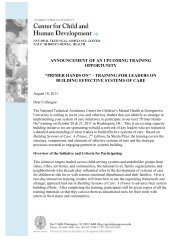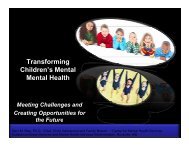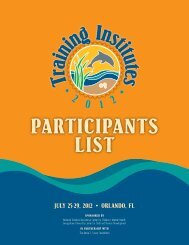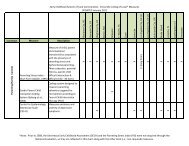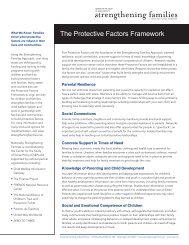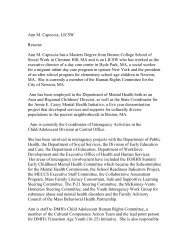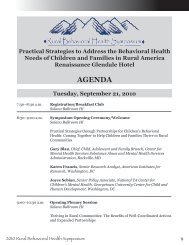Training Institutes 2012 - National Technical Assistance Center for ...
Training Institutes 2012 - National Technical Assistance Center for ...
Training Institutes 2012 - National Technical Assistance Center for ...
Create successful ePaper yourself
Turn your PDF publications into a flip-book with our unique Google optimized e-Paper software.
WORKSHOPS<br />
agencies. Faculty will outline the planning and implementation process <strong>for</strong> this unique method of cross-system, school<br />
and student support programming with the goal of preparing participants to implement similar approaches in their<br />
communities and states.<br />
This approach emerged from a review of evidence-based practices related to school success in high-need communities.<br />
Child-serving agencies were engaged in a unique collaboration to pilot a model of school and student support. In the<br />
New York City pilot program, the model Promise Zones was implemented under the structure and leadership of the<br />
city’s Positive Behavioral Interventions and Supports (PBIS) team, a prevention support model that enables educators to<br />
adopt school-wide systems which improve behavioral outcomes and build positive school climate. PBIS is a three-tiered,<br />
behavioral process supporting implementation of classroom-based group and individualized interventions<br />
Specific topics to be covered include:<br />
• The planning and implementation process with a focus on challenges and lessons learned<br />
• Key data collection points required <strong>for</strong> tracking success (process and outcome measures)<br />
• Policy and procedure development, including communication protocols<br />
• Role and responsibility definition required between collaborating entities (schools, community providers, PBIS, etc.)<br />
• Report on client outcomes (office discipline referrals, school attendance, Child and Adolescent Needs and Strengths<br />
data) and process measures<br />
The session will include interactive small group exercises designed to assist with planning or replicating similar school<br />
programming. The faculty team <strong>for</strong> the session will offer the perspectives of child and family clinicians and<br />
administrators with extensive experience in planning and providing a wide array of mental health and family advocacy<br />
services to at-risk children, adolescents, and their families residing in high-need communities.<br />
MODERATOR/PRESENTER: Jessica Fear, M.A., L.M.F.T., Director of Children’s Services, Community Mental<br />
Health Services, Visiting Nurse Service of New York, New York, NY<br />
Devon Bandison, M.P.A., Program Director, Community Mental Health Services, Visiting Nurse Service of New York,<br />
New York, NY<br />
RESOURCE PERSONS: Neil Pessin, Ph.D., Vice President, Community Mental Health Services, Visiting Nurse<br />
Service of New York, New York, NY<br />
David Lindy, M.D, Clinical Director/Chief Psychiatrist, Community Mental Health Services, Visiting Nurse Service of<br />
New York, New York, NY<br />
WORKSHOP #7 1:30 PM THURSDAY • 10:30 AM SATURDAY • TALLAHASSEE 1-2<br />
Wraparound in the Faith Community: The Open Table Model<br />
OBJECTIVES—Participants will learn:<br />
1. The challenges of youth and young adults aging out of foster care<br />
2. Strategies <strong>for</strong> developing long-term supports and relationships to sustain young adults<br />
3. Key components of engaging, equipping, and supporting the faith community in providing highly individualized care<br />
4. How “Open Table,” a grassroots movement, intersects with high-fidelity wraparound<br />
This Workshop will focus on an innovative strategy that bridges research and practice in a community collaborative<br />
ef<strong>for</strong>t to produce sustainable outcomes <strong>for</strong> youth aging out of foster care with a high return on investment. Faculty will<br />
highlight the Open Table model that mobilizes the faith community by tapping into resources of individual<br />
congregations to support these youth. The approach involves creating long-term, personal relationships with young<br />
adults who have aged out of foster care. These relationships have proven to be powerful in trans<strong>for</strong>ming not only the<br />
individual served, but the attitudes and the sense of empowerment of the Open Table volunteers.<br />
Open Table is a faith-based model with five years of research, development, and expansion experience. The approach<br />
has the potential to change the fate of youth aging out of foster care who, based on recent studies, will likely find<br />
themselves in poverty with little or no support. The model shares the core values of high-fidelity wraparound and<br />
68 <strong>Training</strong> <strong>Institutes</strong> <strong>2012</strong>



